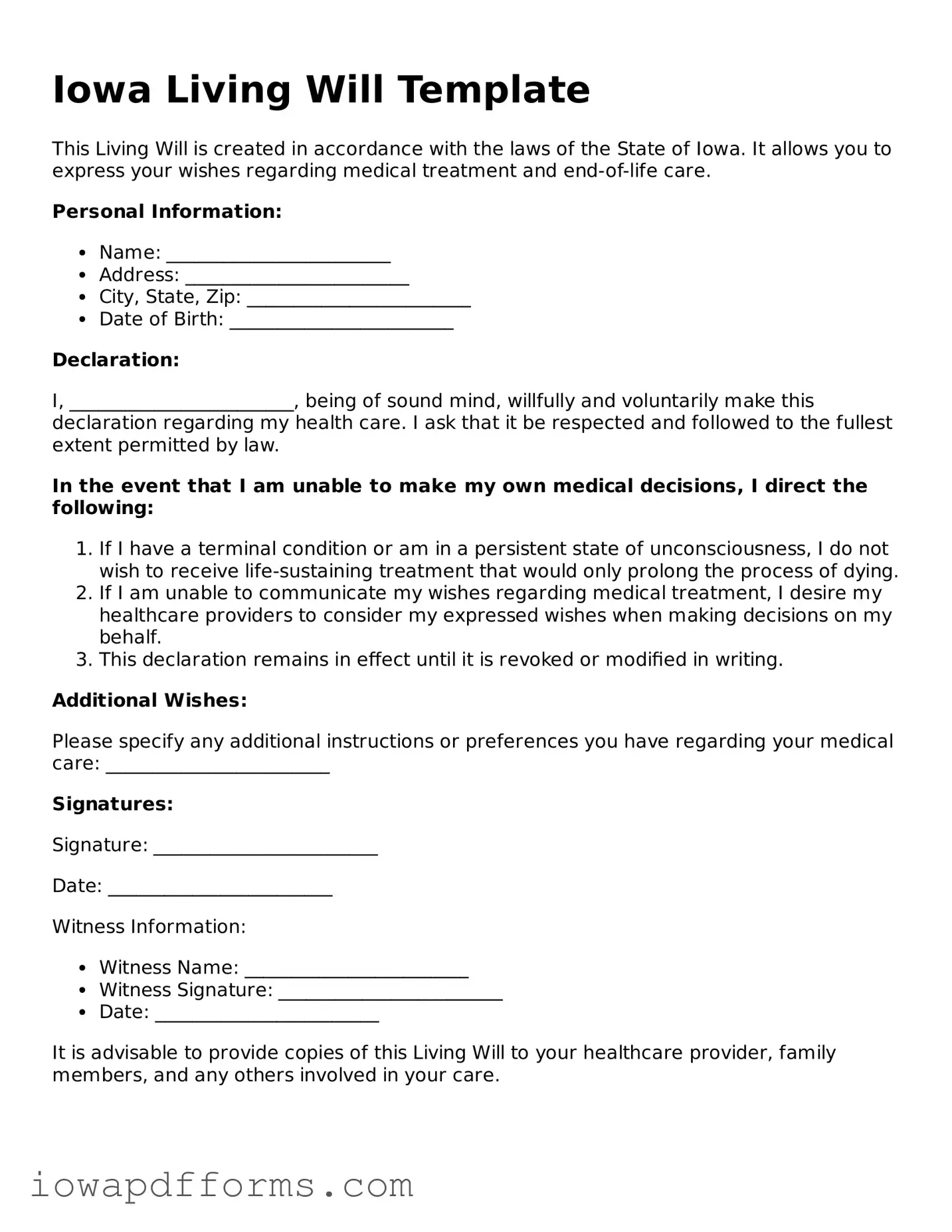The Iowa Living Will form shares similarities with the Advance Directive, which serves as a broader category encompassing various legal documents that outline a person's healthcare preferences. An Advance Directive can include both a Living Will and a Durable Power of Attorney for Health Care. While the Living Will specifies the types of medical treatment one does or does not want in end-of-life situations, the Advance Directive allows individuals to express their wishes regarding a wider range of healthcare decisions, ensuring their preferences are honored even if they cannot communicate them at the time of need.
Another document closely related to the Iowa Living Will is the Durable Power of Attorney for Health Care. This legal form allows individuals to designate a trusted person to make healthcare decisions on their behalf if they become unable to do so. While the Living Will outlines specific medical treatment preferences, the Durable Power of Attorney provides the appointed agent with the authority to make decisions based on the individual’s best interests, guided by their expressed wishes. This combination ensures that both specific and broader healthcare choices are respected.
The Physician Orders for Life-Sustaining Treatment (POLST) form is another document that complements the Iowa Living Will. POLST is designed for individuals with serious health conditions and translates their treatment preferences into actionable medical orders. Unlike the Living Will, which is more general, POLST is tailored to specific medical scenarios and is intended for use by healthcare providers in emergency situations. This ensures that a person’s wishes regarding life-sustaining treatments are immediately accessible and enforceable by medical professionals.
For those involved in the sale or purchase of a trailer, it is essential to utilize a Trailer Bill of Sale form to clearly document the transaction details and protect both parties. This legal document outlines the specifics of the sale, including the terms and conditions associated with the trailer transfer. For further assistance in creating this important document, you can visit https://billofsaleforvehicles.com/editable-trailer-bill-of-sale.
In addition to these, the Do Not Resuscitate (DNR) order is a critical document that aligns with the principles of the Iowa Living Will. A DNR order specifically instructs medical personnel not to perform cardiopulmonary resuscitation (CPR) if a person’s heart stops or they stop breathing. While the Living Will addresses broader treatment preferences, the DNR provides a clear directive in emergency situations, ensuring that the individual’s wishes regarding resuscitation efforts are honored without ambiguity.
The Health Care Proxy is another important document that works in tandem with the Iowa Living Will. This form allows individuals to appoint someone to make healthcare decisions on their behalf if they become incapacitated. Similar to the Durable Power of Attorney, the Health Care Proxy focuses on ensuring that a trusted person can advocate for the individual’s healthcare preferences, including those outlined in the Living Will. This relationship between the two documents reinforces the importance of having a reliable advocate in healthcare decision-making.
The Medical Power of Attorney is yet another document that parallels the Iowa Living Will. This legal form grants a designated individual the authority to make medical decisions for someone who is unable to do so. While the Living Will provides specific instructions about treatment preferences, the Medical Power of Attorney allows the appointed person to interpret and make decisions in real-time situations, ensuring that the individual’s wishes are followed closely, even as circumstances evolve.
Lastly, the End-of-Life Care Plan is a comprehensive document that shares common ground with the Iowa Living Will. This plan encompasses not only medical treatment preferences but also addresses emotional, spiritual, and practical aspects of end-of-life care. While the Living Will focuses primarily on medical interventions, the End-of-Life Care Plan offers a holistic approach, ensuring that all facets of a person’s wishes are considered, promoting dignity and comfort during the final stages of life.

